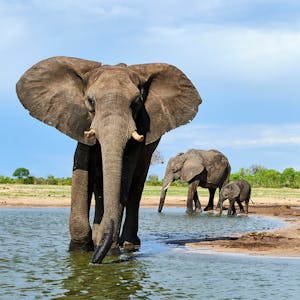This course delves into the intricate world of ecology and ecosystem dynamics through a systems thinking lens. Using Mozambique's Gorongosa National Park as a case study, learners will investigate the complexities of managing ecosystems and the impact of anthropogenic disruption. Through engaging modules, participants will gain insights into conservation and the role of humans in ecosystem recovery.
Certificate Available ✔
Get Started / More Info
This course comprises five modules that delve into the intricacies of ecology, ecosystem dynamics, and conservation. Explore topics such as ecosystem recovery, population dynamics, species coexistence, ecosystem functioning, and conservation strategies.
Module One introduces learners to the scientific study of ecosystems and focuses on Africa's savanna ecosystems. Participants will delve into the fundamentals of ecology, biodiversity, and systems thinking while examining the potential for ecosystem recovery from anthropogenic disruptions.
Module Two delves into population dynamics and species interactions, utilizing a case study on modeling population growth and surveying ant diversity in Gorongosa National Park. Learners will gain insights into the study of populations and their ecological significance.
Module Three explores the coexistence of species within ecosystems, emphasizing the role of keystone species, trophic cascades, and community structures. Participants will examine ecological networks and the interactions between species, gaining a comprehensive understanding of species coexistence.
Module Four investigates the complexities of an ecosystem as a system, addressing climate stress, coastal food webs, and the flow of energy and matter within ecosystems. Learners will explore ecosystem services, functioning, and resilience, gaining insights into the systemic nature of ecosystems.
Module Five focuses on conservation and restoration strategies, highlighting the importance of ecology and biodiversity conservation in the Anthropocene era. Participants will explore biocultural approaches to conservation and consider the future of ecosystems, particularly Gorongosa National Park.
Immerse yourself in the world of immunology with a specialisation that delves into the immune system, its failures, and their clinical implications.
This course offers an in-depth exploration of dental medicine, covering oral health, anatomy, diseases, and treatments, aimed at enhancing patient care and community...
Music as Biology: What We Like to Hear and Why
This course explores the battle between antibiotics and superbugs, offering insights into the historical discovery, classification, and misuse of antibiotics. Join...